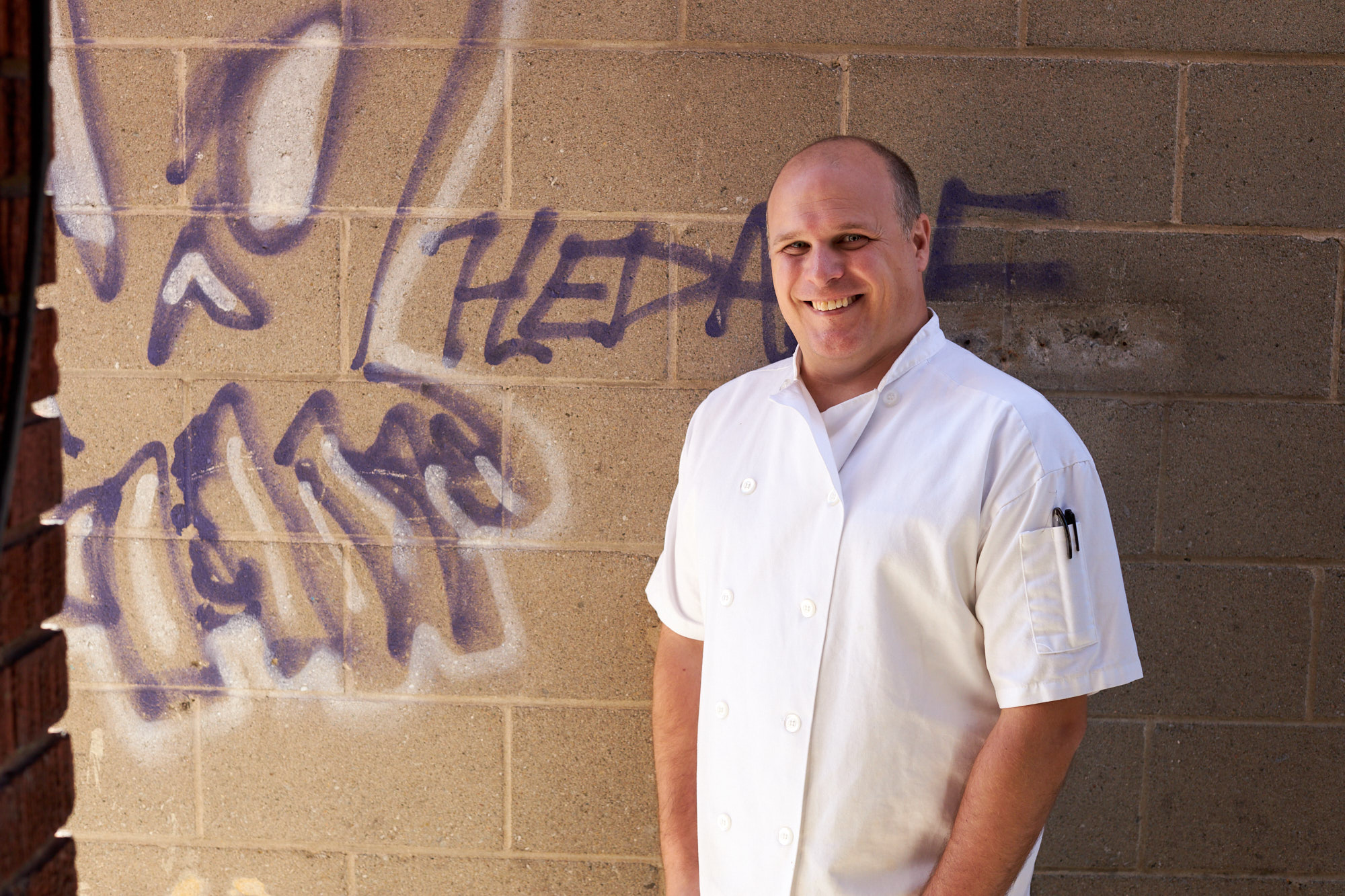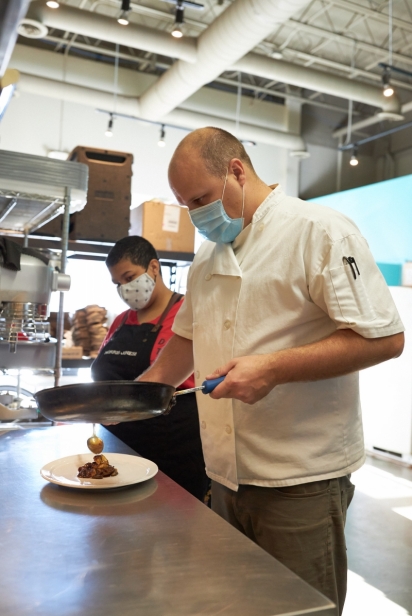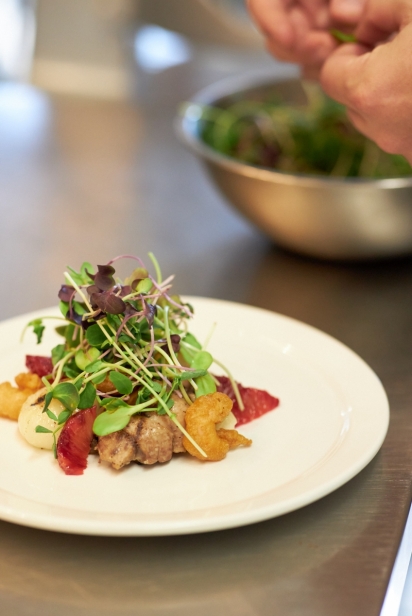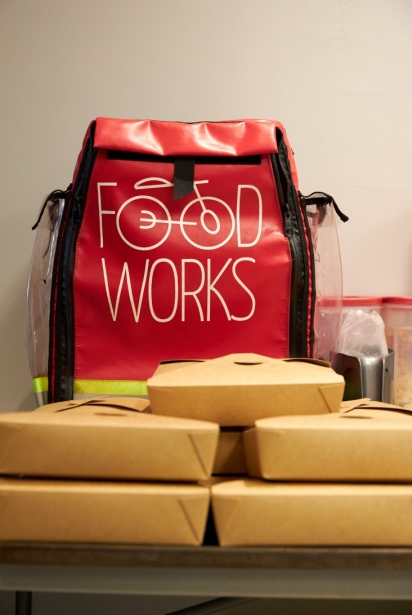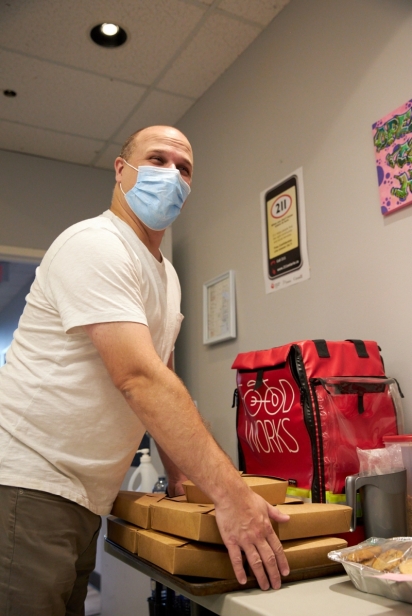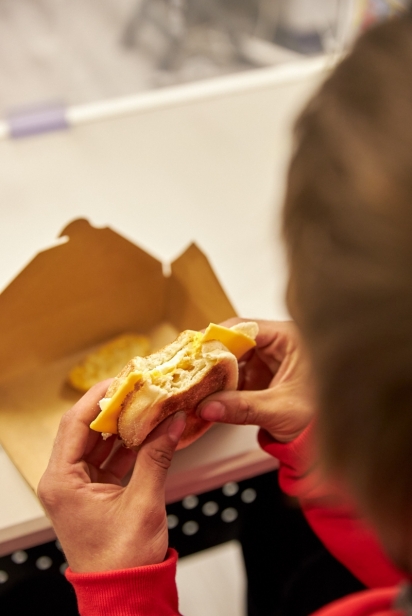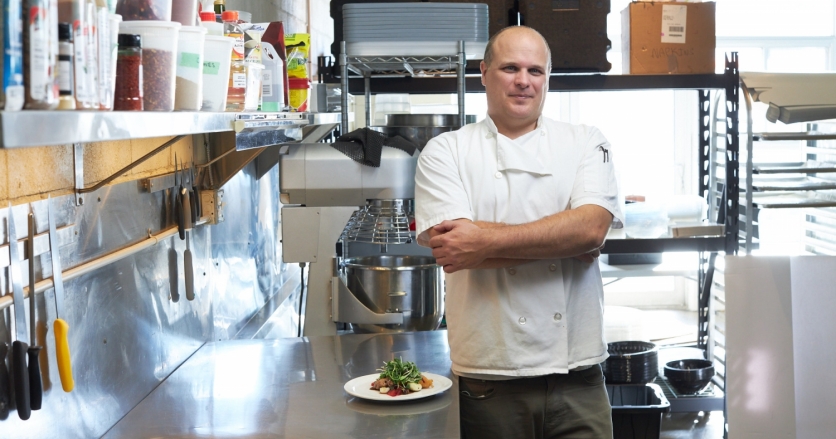'Like I Belong'
For as long as Tim Stock can remember, he’s been cooking. He was still in diapers when he first started learning alongside his mom. He would stand on a chair to help her cook, and as soon as he was tall enough, he started making breakfasts for his family.
Now, at 40, and after a 16-year career with stints in several top restaurants, he’s back to making breakfast. He produces a well- rounded morning meal every day for a group of disadvantaged youth at Operation Come Home. After breakfast, he becomes an instructor and mentor for those interested in pursuing a culinary career or using cooking skills to get back on their feet.
A turning point
After an epiphany that came to him in the early days of the COVID-19 pandemic, Stock says he’s now doing something he truly loves. Like many chefs, he had spent his career striving for the validation all chefs seek — good reviews, culinary awards and increasingly high-profile jobs. But the pandemic changed that. When the lockdowns occurred, he was laid off from his job as executive chef at Thyme & Again Creative Catering and, to keep busy, he started working for Food for Thought, a charity that cooks and distributes hot meals for low-income families, seniors and others who can't cook for themselves.
“When the pandemic hit, catering went from 100 per cent to zero per cent and I was laid off,” Stock says. “I was looking for something to do so I volunteered with [Thali chef] Joe Thottungal, [who was providing his kitchen for] Food for Thought. I ran the program for five weeks and I really, really enjoyed it. I had done volunteering in the past, but Food for Thought was the first time I really dove into it head-first — it was 40 hours a week and it was very rewarding. That changed my perspective. I went from wanting to cook in restaurants and cook for myself, to doing it more for the community that struggles to put food on the table and doesn’t have opportunity to go to a restaurant.”
Epiphanies are great, but unfortunately, he also had bills to pay. He approached a friend he knew was well connected. That friend happens to sit on the board of Operation Come Home, an organization that has, for 50 years, worked to prevent homeless youth from becoming homeless adults. The charity was looking for a chef. He interviewed and was soon at the helm of a program that, in addition to providing youth with breakfast, also gives them access to a food bank, telephones, computers, basic needs and harm reduction supplies and general housing support. And some of them are lucky enough to be taken into FoodWorks, Operation Come Home's social enterprise. FoodWorks offers at-risk youth from Operation Come Home the chance to learn culinary and employment skills. Stock teaches the young people to prepare high-quality, from-scratch take-away meals that are nutritious and tasty. Proceeds from the catering and frozen food enterprise go toward supporting Operation Come Home’s mission.
Given his desire to marry doing community work and cooking, it seems he’s landed his dream job.
“I really enjoy it,” he says. “Getting an email from a youth who worked here saying it’s helped them get on their feet, that’s better than any review. I do enjoy the teaching aspect of cooking. When I was in school, I enjoyed being that student that others went to for help. I’ve liked the teaching and nurturing aspect in any job I’ve had.”
And it’s not his first experience teaching. He taught high school students who wanted a taste of culinary training through Algonquin College.
“That taught me the structure of being a teacher, which was very valuable,” Stock says. “The time I spent at Thyme & Again was also very valuable because what we do here translates pretty much directly [in terms of catering.]”
The students who come through the program receive the title of kitchen assistant and earn minimum wage. If there’s a day where there are no catering or frozen food orders, Stock turns the Foodworks kitchen into a school and teaches them the foundations of cooking — how to make pasta from scratch or a basic tomato sauce, for example.
“I want to give them very basic cooking skills they can use if they want to pursue a career in culinary,” he says. “If they decide not to, they still get skills they can use for the rest of their lives. It teaches them how to be organized, multitask, plan a menu, talk to clients. Since I’ve been here, I’ve had three youth move through the program and all three have moved into a cooking job. One reached out to me to say ‘Thank you for giving me the skills.’
The dish
Asked to produce a dish that defines his culinary philosophy, he made sweetbreads with a wild mushroom and currant demi- glace, popcorn shrimp done in tempura batter, cippolini onions (braised then grilled), blood orange supremes and a top salad of pea, sunflower and radish microgreens, punctuated by fresh basil and mint leaves. He poached the sweetbreads, then pressed them and tossed them in salt and pepper before finishing them on the grill. He pan-fried the shrimp in tempura batter. As he plated the dish, he explained the steps to a young woman who’s working several days a week in his kitchen.
Asked about how the dish defines him, he said developing his style was a long evolution, but that he now seeks to have bright, contrasting flavours while keeping things “pretty simple” and trying to give the tastebuds different sensations.
“I like having different colours,” he says. “The mushroom demi is the umami, then you brighten it up with the blood orange and then add the different textures — that’s why I did the tempura on the shrimp and then grilled the sweetbreads. That microgreen salad had mint and basil and they kind of pop. I had peppery and earthy and sweet microgreens. I don’t like gimmicky fluffy things. Everything serves a purpose.”
Stock's culinary journey
Given his predilection for cooking while still in diapers, and the fact that when he was in Grade 12, he completed a three-month culinary certificate from Red River College, it wasn’t a surprise to anyone that Stock became a chef. Except maybe himself.
Out of high school, he enrolled in a three-year program fine arts program at Lakehead University in Thunder Bay, where he majored in drawing and printmaking and minored in sculpture, painting and philosophy. But as soon as he graduated, he knew fine arts was something he would do for himself, not as a career. He took a year off to think about what he wanted to do to pay the bills.
“I was always obsessed with cooking so people asked me if I’d ever thought about culinary school. I hadn’t.”
Before that gap year was out, he was enrolled in culinary school at the Northern Alberta Institute of Technology.
“NAIT did a great job of selling the program and I really dove head-in,” he says. “I took school quite seriously.”
While he was studying, he worked at the Westin and the Fairmont, joined the student culinary club and was on the school’s culinary team.
“I was in a kitchen seven days a week — 18 hours a day,” Stock recalls. “I was burnt out, happy and obsessed. I felt like I had a late start, but I was a bit more mature than the other students and had the experience of university so I knew how to buckle down. I moved to the head of the class and took advantage of any opportunity to get experience. I was a sponge.”
He would cook for anyone who expressed an interest in his food, from his mom to his brother’s new girlfriend, who was Vietnamese and whom he wanted to impress with his Asian food chops.
“I looked for any excuse to cook something fancy,” he says. “Remember, I grew up in the prairies where it’s meat and potatoes. The town I grew up in [Morden, Man.] had 3,500 people, so I got really good at braising meats and cooking turkeys.”
His family happens to own one of the largest turkey hatcheries in North America, founded by his mom’s dad and now run by his uncle.
“We cooked turkey all the time,” he says. “It wasn’t until I was a young adult, working in the industry, meeting other people from all over the world that I realized it wasn’t normal to have turkey that often. For me, turkey dinners growing up was a big part of why I went into a culinary career.”
Inspiration and experimentation
When Stock graduated from culinary school, he took a job as a chef at a fishing lodge in Nunavut, serving 42 people a night.
“I got to cook fresh bear, caribou, moose, Arctic char and lake trout,” Stock says, noting that he had to improvise with bear as he’d never cooked it before and there was no wifi at the camp and no smart phones. “That was a huge education for me. Caribou was still warm off the body of the animal [when it arrived in the kitchen.] I had to experiment and figure it out.”
Experimenting has become a theme in his life.
“I’ve learned a ton from experimenting and I really do enjoy it,” he says. “I’ve thrown out a lot of bad ideas, but that’s how you learn.”
From Nunavut, he went to Winnipeg to cook alongside Gojko Bodiroga, a world-class Serbian chef, at Restaurant Dubrovnik, which Bodiroga owned with his brother. When the chef went out on his own and opened Promenade Bistro, Stock became his sous-chef. It was there that he wrote his first-ever menus — breakfast and lunch — while Bodiroga wrote the dinner menu.
“He was the chef that taught me how to make food taste good,” Stock says of Bodiroga, who died in 2021 at the age of 75. “His depth of flavour is unmatched by anyone whose food I’ve experienced. He mentored me in that aspect of cooking.”
After two years, Stock was yearning for a change and, when his best friend said he was moving to Ottawa, Stock decided to tag along. He did his homework and determined that Beckta was the only place he wanted to work. He sent resumés to the restaurant, which had only been open for six years at the time, and he emailed and mailed notes to executive chef Mike Moffatt to follow up. When he got to Ottawa, he hadn’t heard back so he showed up at the restaurant’s door.
Moffatt eventually hired him and his 10 months at Beckta taught him modern techniques and refined fine dining. It was a short stint because his mom became ill and he returned to Winnipeg to be near his parents. There, he worked as an executive chef at a golf course for 18 months. When his mom passed away, he quit that job and took a year off to travel.
“I didn’t go to find a culinary job,” he says. “It was a trip to cope with life at that moment.”
During that time, he went to Antarctica and got to know the cooks on the boat. He told them he was a chef and they welcomed him into their kitchen to see how it operated. After his travels, he returned to Winnipeg and worked for Bodiroga again. He then received an invite to return to Ottawa when a chef de cuisine position opened up at Play food & wine. After more than five years at Play, he moved on to Thyme & Again until the pandemic hit. These days, he’s traded the glamour of cooking for the city’s discerning diners to making a difference in young people’s lives.
‘I feel very valued’
In addition to finding purpose in his new job, Stock says the hours are nice, too. After 16 years of working flat out, he’s enjoying the 8 a.m. to 4 p.m. gig, the paid lunch hour and the holidays off — all of which are unheard of for most chefs.
FoodWorks does have the occasional catering gig on the weekends, but he will take time off the following week if that happens.
“As the organization looks after the at-risk youth, they also look after their employees,” he says. “It’s very well managed, I feel like I’m part of a team, like I belong. I feel very valued. I’m still cooking, putting on a chef jacket, going into a kitchen, but it feels very different. My ambitions and perspectives have really changed. Now I don’t care about a good review, I’m more concerned about making sure my youth have the skills they need. It shifted from being a very inward thing to an outward thing — about what other people need and want. It’s very rewarding.”
Operation Come Home
150 Gloucester St., Ottawa, Ont.
operationcomehome.ca | 613.230.4663
FoodWorks Catering
571 Gladstone Ave., Ottawa, Ont.
foodworksottawa.ca | 613.680.4256


